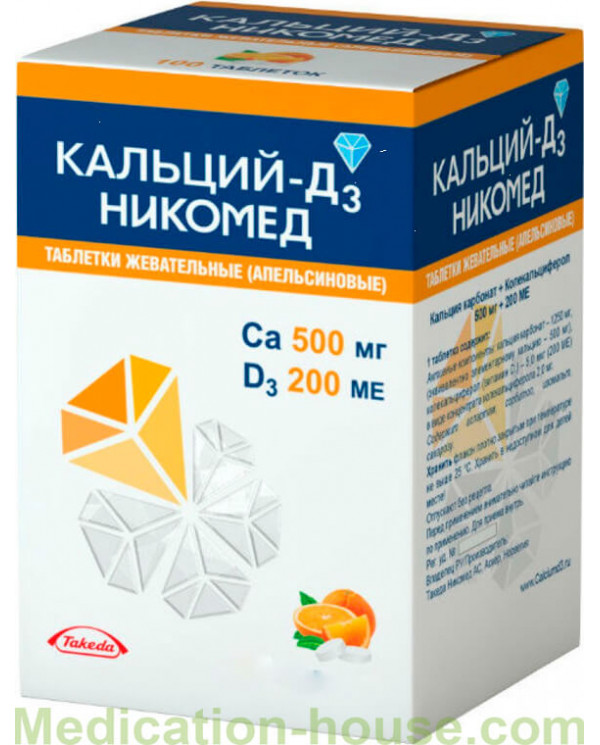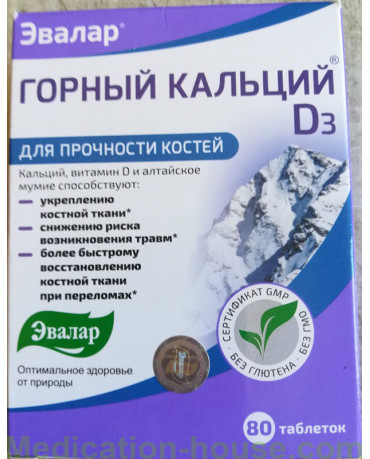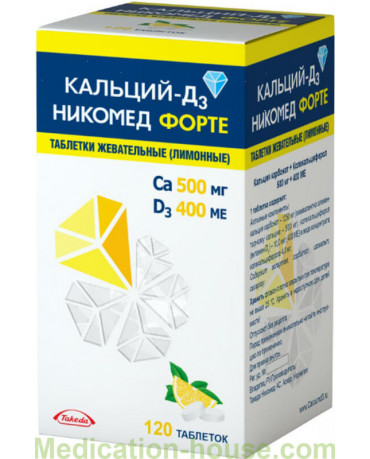Calcium D3 Nycomed instruction
You can buy Calcium D3 Nycomed here
Composition
One tablet contains
active ingredients: calcium carbonate 1250 mg (equivalent to elemental calcium 500 mg), cholecalciferol 5.5 μg (200 IU of vitamin D3) in the form of cholecalciferol concentrate 2.0 mg.
excipients: sorbitol, orange flavoring granules (containing isomalt, orange flavor, mono- and diglycerides of fatty acids), povidone, magnesium stearate, aspartame.
Description
Round biconvex tablets without shell, white with orange flavor. May have small patches and uneven edges.
Pharmacotherapeutic group
Mineral supplements, calcium supplements in combination with other drugs.
Pharmacokinetics
Calcium is absorbed in the ionized form in the distal small intestine by means of an active vitamin D-dependent transport mechanism. Cholecalciferol is absorbed from the small intestine, enters the lymphatic system, enters the liver and into the general bloodstream. In the blood, it binds to alpha2-globulins and partially to albumin, is transferred to the liver, bone tissue, skeletal muscles, kidneys, adrenal glands, myocardium, adipose tissue. The maximum concentration in the tissues is created 4–5 hours after administration, then decreases somewhat, remaining for a long time at a constant level. Deposited in the liver. As a result of biotransformation, active metabolites are formed in the liver and kidneys. In the form of polar metabolites is localized predominantly in the membranes of cells, microsomes, mitochondria and nuclei. Most of cholecalciferol and its metabolic products are excreted with bile into the intestine, from which they can be reabsorbed, creating an enterohepatic circulation system, or excreted with feces. The half-life is several days.
Pharmacodynamics
Combined drug that regulates the exchange of calcium and phosphorus in the body. Reduces resorption (resorption) and increases the density of the bone skeleton and teeth, filling the lack of calcium and vitamin D in the body.
Calcium is involved in the regulation of nerve conduction, muscle contraction and is a component of the blood coagulation system.
Vitamin D3 increases the absorption of calcium in the intestine.
The use of calcium and vitamin D3 prevents the increase in the production of parathyroid hormone (PTH), which is a stimulator of increased bone resorption (leaching of calcium from the bones).
Indications for use
- prevention and complex therapy of osteoporosis (menopausal, senile, steroid, idiopathic, etc.) and its complications (bone fractures)
- replenishment of calcium deficiency and / or vitamin D associated with insufficient intake of them from food
- increased body's need for calcium and vitamin D
- During pregnancy and breastfeeding
- children and teenagers in the period of intensive growth
Dosage and administration
Adults and children over 12 years old - 1 tablet 2 times a day. In order to prevent Calcium – D3, Nycomed is taken for 3 months 1 - 2 times a year, for treatment purposes at least 6 months.
Children from 3 - 5 years 1 tablet per day, 6 - 11 years 1-2 tablets per day.
The tablet can be chewed or swallowed whole, mainly during the meal.
Side effects
- hypercalcemia, hypercalciuria
- constipation, flatulence, nausea, abdominal pain, diarrhea, dyspepsia
- itch, rash, urticaria
- milk alkaline syndrome
Contraindications
- hypersensitivity to one of the components of the drug
- hypercalcemia or hypercalciuria (elevated calcium in the blood or urine)
- vitamin D hypervitaminosis
- urolithiasis disease
- phenylketonuria
Drug interactions
With the simultaneous use of diuretics thiazide series increases the risk of hypercalcemia, because they increase tubular calcium reabsorption. Furosemide and other loop diuretics, on the contrary, increase calcium excretion by the kidneys.
Calcium and vitamin D can reduce the absorption of tetracyclines from the gastrointestinal tract, so the interval between taking the tetracycline drug and Calcium - D3 Nycomed should be at least 4 hours.
Absorption of quinolone antibiotics may be impaired when taken simultaneously with Calcium-D3 Nycomed. Quinolone antibiotics should be taken two hours before or six hours after taking Calcium – D3 Nycomed.
With simultaneous treatment with cardiac glycosides, ECG and clinical monitoring is necessary, since calcium supplements can potentiate the therapeutic and toxic effects of cardiac glycosides.
If bisphosphonates are used concomitantly with calcium preparations, then bisphosphonates should be administered at least one hour before consuming Calcium-D3 Nycomed, since gastrointestinal absorption may be reduced.
Glucocorticosteroids reduce calcium absorption, therefore, treatment with glucocorticosteroids may require an increase in the dose of calcium-D3 Nycomed.
The effectiveness of levothyroxine can be reduced while taking Calcium – D3 Nycomed, due to a decrease in the absorption of levothyroxine. Calcium – D3 Nycomed and levothyroxine intake should be separated by at least four hours.
special instructions
In patients who are simultaneously taking cardiac glycosides and / or diuretics, it is necessary to control the concentration of calcium and creatinine in the blood serum.
In the case of hypercalcemia or signs of impaired renal function, the dose should be reduced or temporarily discontinued treatment.
Vitamin D should be used with caution in patients with impaired renal function, they should be monitored for calcium and phosphorus. In patients with severe renal insufficiency, vitamin D (in the form of cholecalciferol) is not normally metabolized and other forms of vitamin D must be used.
Calcium-D3 Nycomed should be prescribed with caution to patients suffering from sarcoidosis, due to the risk of increased metabolism of vitamin D in its active form. In these patients, serum calcium and urine should be monitored.
Calcium-D3 Nycomed should be used with caution in immobilized patients with osteoporosis because of the risk of developing hypercalcemia.
In order to avoid overdose, it is necessary to consider the additional intake of vitamin D from other sources.
Patients with rare hereditary diseases of fructose intolerance, glucose-galactose malabsorption or sucrose-isomaltase deficiency should not take this medicine.
Pediatric use
Data on the use of Calcium-D3 Nycomed in children under the age of 3 years is not available.
Pregnancy and lactation
During pregnancy, the daily dose should not exceed 1500 mg of calcium and 600 IU of vitamin D3. Vitamin D and its metabolites can penetrate into breast milk.
Therefore, it is necessary to take into account the intake of calcium and vitamin D from other sources in the mother and child and to carry out medical monitoring.
The peculiarity of the influence of the drug on the ability to drive a vehicle or potentially dangerous machinery
Does not affect the ability to drive vehicles and mechanisms.
Overdose
Symptoms: hypercalcemia, hypervitaminosis, anorexia, thirst, polyuria, nausea, vomiting, constipation, abdominal pain, fatigue, bone pain, nephrocalcinosis, muscle weakness, emotional disorders, in severe cases - cardiac arrhythmia.
Treatment: the abolition of the drug, the introduction into the body of a large amount of fluid, the use of loop diuretics (eg, furosemide), glucocorticosteroids, calcitonin, bisphosphonates. It is necessary to control the level of serum electrolytes, kidney function and diuresis.
Storage conditions
Store in a tightly closed vial at a temperature not higher than 25 С.
Keep out of the reach of children!
Shelf life - 3 years
Do not apply after the expiration date.
Terms of sell
You don't need a prescription to buy Calcium D3 Nycomed.





